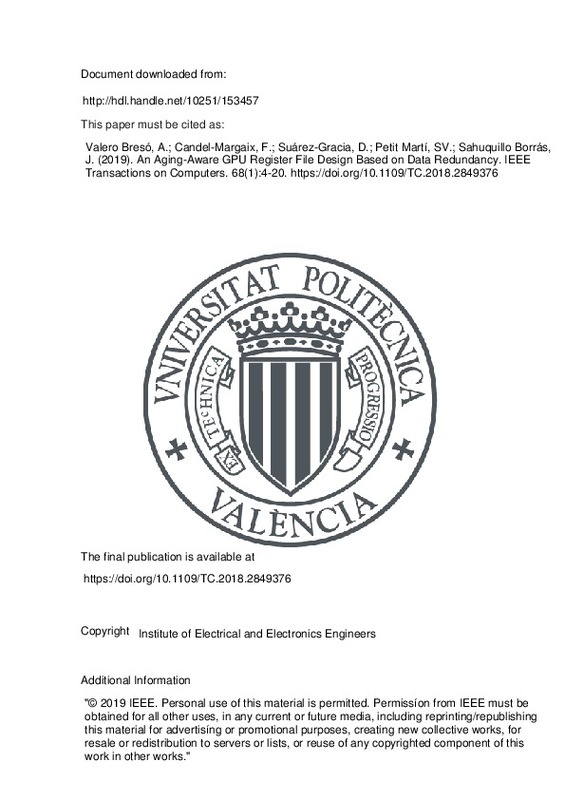JavaScript is disabled for your browser. Some features of this site may not work without it.
Buscar en RiuNet
Listar
Mi cuenta
Estadísticas
Ayuda RiuNet
Admin. UPV
An Aging-Aware GPU Register File Design Based on Data Redundancy
Mostrar el registro sencillo del ítem
Ficheros en el ítem
| dc.contributor.author | Valero Bresó, Alejandro
|
es_ES |
| dc.contributor.author | Candel-Margaix, Francisco
|
es_ES |
| dc.contributor.author | Suárez-Gracia, Darío
|
es_ES |
| dc.contributor.author | Petit Martí, Salvador Vicente
|
es_ES |
| dc.contributor.author | Sahuquillo Borrás, Julio
|
es_ES |
| dc.date.accessioned | 2020-10-29T04:31:38Z | |
| dc.date.available | 2020-10-29T04:31:38Z | |
| dc.date.issued | 2019-01-01 | es_ES |
| dc.identifier.issn | 0018-9340 | es_ES |
| dc.identifier.uri | http://hdl.handle.net/10251/153457 | |
| dc.description | "© 2019 IEEE. Personal use of this material is permitted. Permissíon from IEEE must be obtained for all other uses, in any current or future media, including reprinting/republishing this material for advertisíng or promotional purposes, creating new collective works, for resale or redistribution to servers or lists, or reuse of any copyrighted component of this work in other works." | es_ES |
| dc.description.abstract | [EN] Nowadays, GPUs sit at the forefront of high-performance computing thanks to their massive computational capabilities. Internally, thousands of functional units, architected to be fed by large register files, fuel such a performance. At deep nanometer technologies, the SRAM memory cells that implement GPU register files are very sensitive to the Negative Bias Temperature Instability (NBTI) effect. NBTI ages cell transistors by degrading their threshold voltage Vth over the lifetime of the GPU. This degradation, which manifests when a cell keeps the same logic value for a relatively long period of time, compromises the cell read stability and increases the transistor switching delay, which can lead to wrong read values and eventually exceed the processor cycle time, respectively, so resulting in faulty operation. Thiswork proposes architectural mechanisms leveraging the redundancy of the data stored in GPU register files to attack NBTI aging. The proposed mechanisms are based on data compression, power gating, and register address rotation techniques. All these mechanismsworking together balance the distribution of logic values stored in the cells along the execution time, reducing both the overall Vth degradation and the increase in the transistor switching delays. Experimental results show that a conventional GPU register file suffers the worst case for NBTI, since a significant fraction of the cells maintain the same logic value during the entire application execution (i.e., a 100 percent '0' and '1' duty cycle distributions). On average, the proposal reduces these distributions by 58 and 68 percent, respectively, which translates into Vth degradation savings by 54 and 62 percent, respectively. | es_ES |
| dc.description.sponsorship | This work was supported by the Gobierno de Aragon and the European ESF (gaZ: T58_17R research group), and by the Ministerio de Economia y Competitividad (MINECO) and AEI/FEDER (EU) funds under Grants TIN2016-76635-C2-1-R and TIN2015-66972-C5-1-R. | es_ES |
| dc.language | Inglés | es_ES |
| dc.publisher | Institute of Electrical and Electronics Engineers | es_ES |
| dc.relation.ispartof | IEEE Transactions on Computers | es_ES |
| dc.rights | Reserva de todos los derechos | es_ES |
| dc.subject | Data compression | es_ES |
| dc.subject | Duty cycle | es_ES |
| dc.subject | GPU architectures | es_ES |
| dc.subject | NBTI | es_ES |
| dc.subject | Register files | es_ES |
| dc.subject | Threshold voltage degradation | es_ES |
| dc.subject.classification | ARQUITECTURA Y TECNOLOGIA DE COMPUTADORES | es_ES |
| dc.title | An Aging-Aware GPU Register File Design Based on Data Redundancy | es_ES |
| dc.type | Artículo | es_ES |
| dc.identifier.doi | 10.1109/TC.2018.2849376 | es_ES |
| dc.relation.projectID | info:eu-repo/grantAgreement/MINECO//TIN2015-66972-C5-1-R/ES/TECNICAS PARA LA MEJORA DE LAS PRESTACIONES, COSTE Y CONSUMO DE ENERGIA DE LOS SERVIDORES/ | es_ES |
| dc.relation.projectID | info:eu-repo/grantAgreement/MINECO//TIN2016-76635-C2-1-R/ES/ARQUITECTURA Y PROGRAMACION DE COMPUTADORES ESCALABLES DE ALTO RENDIMIENTO Y BAJO CONSUMO/ | es_ES |
| dc.relation.projectID | info:eu-repo/grantAgreement/Gobierno de Aragón//T58_17R/ | es_ES |
| dc.rights.accessRights | Abierto | es_ES |
| dc.contributor.affiliation | Universitat Politècnica de València. Departamento de Informática de Sistemas y Computadores - Departament d'Informàtica de Sistemes i Computadors | es_ES |
| dc.description.bibliographicCitation | Valero Bresó, A.; Candel-Margaix, F.; Suárez-Gracia, D.; Petit Martí, SV.; Sahuquillo Borrás, J. (2019). An Aging-Aware GPU Register File Design Based on Data Redundancy. IEEE Transactions on Computers. 68(1):4-20. https://doi.org/10.1109/TC.2018.2849376 | es_ES |
| dc.description.accrualMethod | S | es_ES |
| dc.relation.publisherversion | https://doi.org/10.1109/TC.2018.2849376 | es_ES |
| dc.description.upvformatpinicio | 4 | es_ES |
| dc.description.upvformatpfin | 20 | es_ES |
| dc.type.version | info:eu-repo/semantics/publishedVersion | es_ES |
| dc.description.volume | 68 | es_ES |
| dc.description.issue | 1 | es_ES |
| dc.relation.pasarela | S\392214 | es_ES |
| dc.contributor.funder | Gobierno de Aragón | es_ES |
| dc.contributor.funder | European Social Fund | es_ES |
| dc.contributor.funder | European Regional Development Fund | es_ES |
| dc.contributor.funder | Ministerio de Economía y Competitividad | es_ES |







![[Cerrado]](/themes/UPV/images/candado.png)

